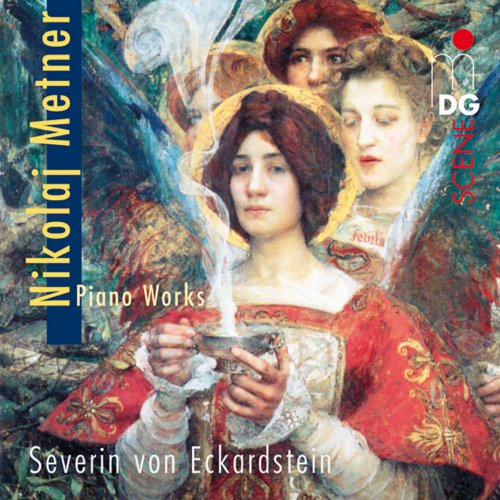
Severin von Eckardstein - Metner: Piano Works (2007)
BAND/ARTIST: Severin von Eckardstein
- Title: Metner: Piano Works
- Year Of Release: 2007
- Label: Musikproduktion Dabringhaus und Grimm (MDG)
- Genre: Classical Piano
- Quality: flac lossless (image +.cue, log, artwork) +Booklet
- Total Time: 01:13:41
- Total Size: 211 mb
- WebSite: Album Preview
Tracklist
01. Canzona matinata, Op. 39,4: Allegretto cantando
02. Sonata tragica, Op. 39,5: Allegro risoluto
03. Hymne vor der Arbeit, Op. 49,1: Allegretto molto tranquillo
04. Märchen, Op. 26,1: Allegretto frescamente
05. March of the Paladin, Op. 14,2: Allegro marciale
06. Houmoresque: Vivace
07. Märchen, Op. 26,3: Narrante a piacere
08. Stimmungsbild, Op. 1,5: Andante
09. Märchen, Op. 35,4: Allegro appassionato e tempestoso
10. Leichtes Klavierstück Nr. 1: Allegretto leggiero
11. Albumblatt: Andantino (quasi allegretto)
12. Sonata in E Minor, Op. 25,2 "Night Wind": I. Introduzione. Andante con moto-Allegro
13. Sonata in E Minor, Op. 25,2 "Night Wind": II. Allegro molto sfrenamente, presto
The 1901 Steinway that Severin von Eckardstein uses throughout his MDG Medtner recital appears to be the same instrument heard in Jean-Eflam Bavouzet’s Ravel and Liszt sessions for the same label. Much as I appreciate this piano’s idiosyncratic registral differentiation and slightly nasal bass, loud passages emerge with more congestion and less clarity than in the Bavouzet releases, while certain notes in the higher octaves hold their tuning less consistently. That aside, Eckardstein plays Medtner to the manner born. Thick, rapidly leaping chords such as those in the early Houmoresque pose no problems. He also displays a more dynamic, volatile temperament than Hamish Milne in the Op. 26 selections–compare Eckardstein’s fearless accelerandos in No. 3 to Milne’s tamer tempo changes and you’ll hear what I mean.
Eckardstein usually proves more liberal with rubato than Marc-André Hamelin in the two sonatas’ lyrical passages, as the Sonata tragica’s second subject demonstrates. Yet Hamelin genuinely manages to translate the composer’s frequent “espressivo marcato” directives into sound. The aforementioned sonic issues particularly hit home in the epic “Night Wind” Sonata. Eckardstein easily commands the notes, yet I find much of his playing in the first section texturally heavy and dynamically careless. The introduction alone illustrates my reservations. While he takes Medtner’s “all’ improvvisa” and “con moto” indications to heart, somehow the music gets stuck in the mud. By contrast, Hamelin takes a slower tempo, yet his keener attention to dynamics and variegated chord voicings convey a greater sense of motion. However, Eckardstein brings more attention to detail to the Allegro molto sfrenatamente section and really distinguishes the composer’s various accentuations, in contrast to the paragraphic sweep of Hamelin’s suaver, brisker, more generalized rendition.
You can split comparative hairs until the cows come home, yet it should be clear that Eckardstein more than holds his own in the company of Medtner’s strongest interpreters. And that’s no small achievement.
01. Canzona matinata, Op. 39,4: Allegretto cantando
02. Sonata tragica, Op. 39,5: Allegro risoluto
03. Hymne vor der Arbeit, Op. 49,1: Allegretto molto tranquillo
04. Märchen, Op. 26,1: Allegretto frescamente
05. March of the Paladin, Op. 14,2: Allegro marciale
06. Houmoresque: Vivace
07. Märchen, Op. 26,3: Narrante a piacere
08. Stimmungsbild, Op. 1,5: Andante
09. Märchen, Op. 35,4: Allegro appassionato e tempestoso
10. Leichtes Klavierstück Nr. 1: Allegretto leggiero
11. Albumblatt: Andantino (quasi allegretto)
12. Sonata in E Minor, Op. 25,2 "Night Wind": I. Introduzione. Andante con moto-Allegro
13. Sonata in E Minor, Op. 25,2 "Night Wind": II. Allegro molto sfrenamente, presto
The 1901 Steinway that Severin von Eckardstein uses throughout his MDG Medtner recital appears to be the same instrument heard in Jean-Eflam Bavouzet’s Ravel and Liszt sessions for the same label. Much as I appreciate this piano’s idiosyncratic registral differentiation and slightly nasal bass, loud passages emerge with more congestion and less clarity than in the Bavouzet releases, while certain notes in the higher octaves hold their tuning less consistently. That aside, Eckardstein plays Medtner to the manner born. Thick, rapidly leaping chords such as those in the early Houmoresque pose no problems. He also displays a more dynamic, volatile temperament than Hamish Milne in the Op. 26 selections–compare Eckardstein’s fearless accelerandos in No. 3 to Milne’s tamer tempo changes and you’ll hear what I mean.
Eckardstein usually proves more liberal with rubato than Marc-André Hamelin in the two sonatas’ lyrical passages, as the Sonata tragica’s second subject demonstrates. Yet Hamelin genuinely manages to translate the composer’s frequent “espressivo marcato” directives into sound. The aforementioned sonic issues particularly hit home in the epic “Night Wind” Sonata. Eckardstein easily commands the notes, yet I find much of his playing in the first section texturally heavy and dynamically careless. The introduction alone illustrates my reservations. While he takes Medtner’s “all’ improvvisa” and “con moto” indications to heart, somehow the music gets stuck in the mud. By contrast, Hamelin takes a slower tempo, yet his keener attention to dynamics and variegated chord voicings convey a greater sense of motion. However, Eckardstein brings more attention to detail to the Allegro molto sfrenatamente section and really distinguishes the composer’s various accentuations, in contrast to the paragraphic sweep of Hamelin’s suaver, brisker, more generalized rendition.
You can split comparative hairs until the cows come home, yet it should be clear that Eckardstein more than holds his own in the company of Medtner’s strongest interpreters. And that’s no small achievement.
Classical | FLAC / APE | CD-Rip
As a ISRA.CLOUD's PREMIUM member you will have the following benefits:
- Unlimited high speed downloads
- Download directly without waiting time
- Unlimited parallel downloads
- Support for download accelerators
- No advertising
- Resume broken downloads


